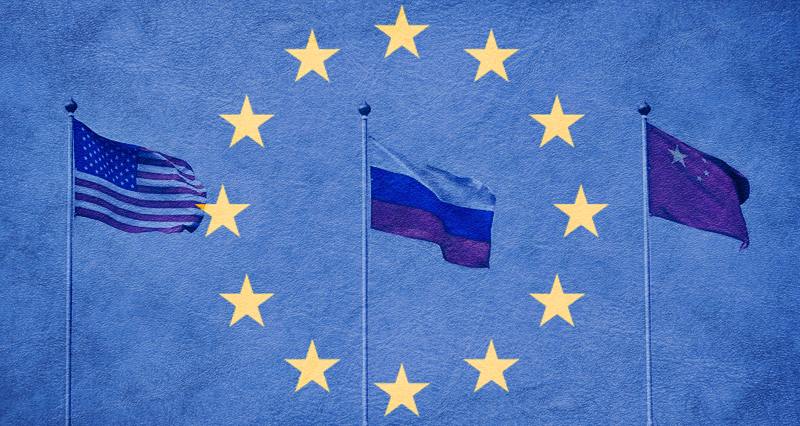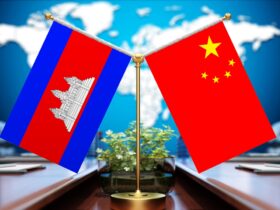The global setting in front of the old continent with Trump’s presidency.
The global setting in front of the old continent with Trump’s presidency.
By Ali Rıza Taşdelen
As international dynamics shift toward a multipolar world and a new global order emerges, the EU is becoming increasingly isolated. Being in a geopolitically and geostrategically fragile position, the EU finds itself floundering, anxious, and in search of its place in the face of the US, Russia, and China. In past geopolitical crises like those in Iraq and Syria, and now in Ukraine, Europe has been unable to act independently without Washington’s approval. This reality also exposes its lack of leadership at the global level.
Since the end of World War II in 1945, Europe has been heavily dependent on the US, particularly in matters of defense and security. This dependency shows no signs of ending anytime soon. The EU’s failure to develop a “Common Security and Defense Policy” stems largely from its inability to break away from the Atlantic framework and from having handed over its defense responsibilities to NATO.
The EU integration process has gone hand in hand with expansion of neoliberal globalization across the old continent led by the US. This has also been a period during which the internal dynamics, social structures, and national sovereignties of European states were gradually weakened. This process, also led to a confrontation between globalists and sovereignists.
Europe’s dependence on the US
During the Biden administration, European globalist leaders nearly doubled their weapons imports. Between 2020 and 2024, European countries increased arms imports by 105% compared to the 2015–2019 period. Of these arms, 64% were supplied by the US. On March 5, French High Commissioner for Planning François Bayrou admitted in the Senate that “two-thirds of the EU’s weapons are purchased from the US”. In Germany, the share of arms imports from the US has surged by nearly 61% in the past five years. Today, more than two-thirds (70%) of Germany’s arms imports come from the US, whereas this figure stood at just 9% between 2015 and 2019. In addition, tens of thousands of US troops and military bases are stationed across Europe and particularly in Germany.
Since the early 2000s, Europe has been a partner in the US’s defeats in Afghanistan, Iraq, Libya, and Syria. It has actively supported NATO’s eastward expansion and Washington’s strategy to encircle Russia. However, the war in Ukraine plunged Europe into an energy crisis, triggered a wave of political instability.
Europe’s isolation with Trump’s second term
Donald Trump’s return to power marked a turning point for Europe. The US, which for nearly 80 years played the role of Europe’s protector, has begun to withdraw from its traditional alliances.
The US-led transatlantic alliance’s strategy to encircle China and Russia could not achieve its goals. On top, and also as a result, of that, Biden’s loss and return of Trump caused globalist leaders to lose their compass.
Under the pretense of pursuing “European security” and sustaining the war in Ukraine independently of the US, they are now attempting to make rearmament a central agenda of politics. However, there are several obstacles to Europe’s rapid decision to militarize. It will take years to rebuild or upgrade military infrastructure and reach meaningful levels of production. Moreover, European economies are on the brink of collapse, drowning in debt.
This situation exposes Europe’s deadlock at a time when it is trying to build “strategic autonomy”. Russia, standing firm against the globalist bloc, has dragged Europe into a crisis it struggles to find a way out.
Europe’s perception of Russian threat
Europe seems like to have fallen into the Cold War-era trap of “Russian threat”. Still, Russia is a neighbor of vital strategic importance for Europe.
Leading the charge of anti-Russian sentiment in Europe is Macron, with the UK as his closest ally. Soon to become Germany’s next chancellor Friedrich Merz appears even more hawkish than Macron. Germany’s recent decisions on rearmament and the budget it has allocated over the past month are alarming. We could envisage that a fierce competition for EU leadership between Macron and Merz is coming.
However, Russia’s economic momentum shows no sign of slowing down. In an article titled “Russia’s Economic Surprise Continues” on observateur-continental.fr, Mikhail Gamandiy-Egorov writes: “According to India’s news agency United News of India (UNI), Russia ranks as the third-fastest-growing economy among the G20 in 2024. With a second consecutive year of 4.1% growth, Russia trails only India—which tops the list with 6.7% growth—and China and Indonesia, both projected to grow by 5%.
Brazil ranks fourth with 3.4% growth, while Türkiye rounds out the top five at 3.2%. Of the top five G20 economies in terms of growth, four—India, China, Russia, and Brazil—are BRICS members. These countries have now surpassed the G7 club, which consists of Western nations plus Japan.
(…)
What Russia’s adversaries once imagined would be an economic apocalypse has turned into a major Russian surprise. The crises that were supposed to destroy Russia have, instead, backfired on those who instigated them. The process is not yet over, but considering how unprofessional the West, the troubles of this global minority are bound to deepen.
China: a competitor or a threat
Once viewed by Europe as just another economic partner, China is now seen as a growing threat by many globalist leaders. Struggling with internal disputes and a rigid bureaucratic structure, Europe has lost its ability to compete with China.
Mohamed Lamine Kaba, a specialist in governance and the geopolitics of regional integration, writes in journal-neo.su/fr:
“Initiatives like the New Silk Road are more than just economic projects; they are powerful geopolitical tools that enhance Beijing’s global influence. In regions like Africa, Asia, and Latin America, China is emerging as a strategic partner, relegating Europe to a secondary role. At the same time, the increasing purchase of critical European infrastructure by Chinese companies highlights the erosion of the Europe’s economic sovereignty. In this multipolar world, China is asserting itself as a visionary and winning power, while Europe, unable to protect its interests or adapt to change, is becoming increasingly marginalized.
(…)
This decline could only be reversed if Europe stops viewing China and Russia as existential threats and instead chooses to cooperate with them.”

















Leave a Reply